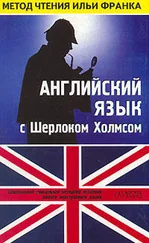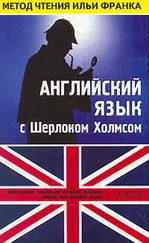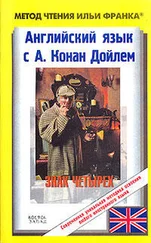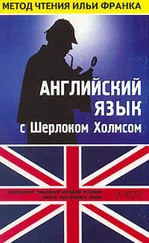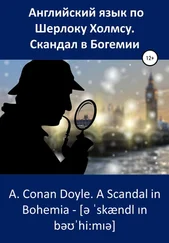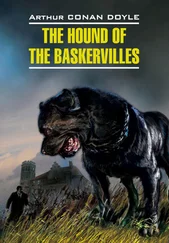"I did not positively say so (я прямо так не сказал) ."
"No, but you evidently think it (да, но вы, несомненно, так думаете = подумали) ."
gesture ['dZestS@], twice [twaIs], peasant ['pez(@)nt]
Sherlock Holmes struck his hand against his knee with an impatient gesture.
"If I had only been there!" he cried. "It is evidently a case of extraordinary interest, and one which presented immense opportunities to the scientific expert. That gravel page upon which I might have read so much has been long ere this smudged by the rain and defaced by the clogs of curious peasants. Oh, Dr. Mortimer, Dr. Mortimer, to think that you should not have called me in! You have indeed much to answer for."
"I could not call you in, Mr. Holmes, without disclosing these facts to the world, and I have already given my reasons for not wishing to do so. Besides, besides —"
"Why do you hesitate?"
"There is a realm in which the most acute and most experienced of detectives is helpless."
"You mean that the thing is supernatural?"
"I did not positively say so."
"No, but you evidently think it."
"Since the tragedy, Mr. Holmes (сразу же после этого несчастья, мистер Холмс; since — с тех пор; сразу же после) , there have come to my ears several incidents (моих ушей достигли /рассказы/ о нескольких случаях) which are hard to reconcile with the settled order of Nature (которые трудно согласовать с «установившимися» законами природы; order — порядок) ."
"For example (например) ?"
"I find that before the terrible event occurred (я узнал, что прежде чем произошло это ужасное событие; to find — находить; выяснять, узнавать) several people had seen a creature upon the moor (несколько человек видели на болотах существо) which corresponds with this Baskerville demon (соответствующее /описанию/ демона /преследующего/ Баскервилей) , and which could not possibly be any animal known to science (и которое определенно не может быть никаким /другим/ животным, известным науке; to know) . They all agreed (все они сходились на том; to agree — соглашаться; сходиться во взглядах) that it was a huge creature (что это было громадное существо) , luminous, ghastly, and spectral (светящееся, жуткое и призрачное) . I have cross-examined these men (я по отдельности опросил этих людей; to cross-examine — подвергнуть перекрестному допросу) , one of them a hard-headed countryman (один из них — сельский житель, /человек/ трезвых взглядов; hard-headed — практичный, расчетливый; трезвый; /уст./ упрямый, несговорчивый) , one a farrier (другой — кузнец) , and one a moorland farmer (а третий — фермер, /живущий на/ болотах) , who all tell the same story of this dreadful apparition (и все они рассказывают одну и ту же историю об этом ужасном призраке) , exactly corresponding to the hell-hound of the legend (/по описанию/ в точности соответствующему адской собаке из легенды) . I assure you that there is a reign of terror in the district (уверяю вас, во /всей/ округе царит ужас; reign — правление; власть, господство) and that it is a hardy man (и /только очень/ отважный человек) who will cross the moor at night (пойдет ночью через болота; to cross — пересекать, переходить) ."
creature ['kri:tS@], huge [hju:dZ], assure [@'Su@]
"Since the tragedy, Mr. Holmes, there have come to my ears several incidents which are hard to reconcile with the settled order of Nature."
"For example?"
"I find that before the terrible event occurred several people had seen a creature upon the moor which corresponds with this Baskerville demon, and which could not possibly be any animal known to science. They all agreed that it was a huge creature, luminous, ghastly, and spectral. I have cross-examined these men, one of them a hard-headed countryman, one a farrier, and one a moorland farmer, who all tell the same story of this dreadful apparition, exactly corresponding to the hell-hound of the legend. I assure you that there is a reign of terror in the district and that it is a hardy man who will cross the moor at night."
"And you, a trained man of science (и вы, образованный человек: «искушенный человек науки»; to train — тренировать, упражнять) , believe it to be supernatural (верите, что это /явление/ сверхъестественное) ?"
"I do not know what to believe (я /уже/ не знаю, чему верить) ."
Holmes shrugged his shoulders (Холмс пожал плечами) .
"I have hitherto confined my investigations to this world (до сих пор мои расследования ограничивались /рамками/ этого мира) ," said he. "In a modest way (по мере своих скромных возможностей; modest — скромный; way — путь; способ, метод) I have combated evil (я борюсь со злом) , but to take on the Father of Evil himself (но бросать вызов самому прародителю зла; to take on — бросать вызов) would, perhaps, be too ambitious a task (было бы, наверное, слишком амбициозной задачей) . Yet you must admit that the footmark is material (однако вы должны признать, что следы /достаточно/ материальны) ."
"The original hound was material enough (собака из легенды была достаточно материальна; original — первоначальный, исходный) to tug a man's throat out (/чтобы/ перегрызть: «выдернуть» человеку горло) , and yet he was diabolical as well (тем не менее, в ней также было /что-то/ дьявольское) ."
science ['saI@ns], shrug [SrVg], hitherto ['hID@tu:]
"And you, a trained man of science, believe it to be supernatural?"
"I do not know what to believe."
Holmes shrugged his shoulders.
"I have hitherto confined my investigations to this world," said he. "In a modest way I have combated evil, but to take on the Father of Evil himself would, perhaps, be too ambitious a task. Yet you must admit that the footmark is material."
"The original hound was material enough to tug a man's throat out, and yet he was diabolical as well."
"I see that you have quite gone over to the supernaturalists (я вижу, что вы совсем перешли на сторону поклонников сверхъестественного; supernaturalist — сущ., произошедшее от прил. supernatural — сверхъестественный) . But now, Dr. Mortimer, tell me this (но теперь, доктор Мортимер, скажите мне вот что) . If you hold these views (если вы придерживаетесь таких взглядов) , why have you come to consult me at all (зачем вы вообще пришли «советоваться» ко мне; at all — совсем; вообще) ? You tell me in the same breath (вы говорите мне одновременно: «на одном и том же дыхании») that it is useless to investigate Sir Charles's death (что расследовать смерть сэра Чарльза бесполезно) , and that you desire me to do it (и что вы хотите, чтоб я это сделал) ."
Читать дальше


